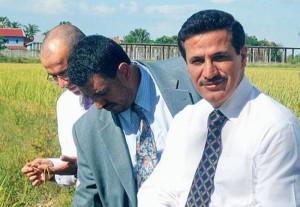
Gulf News | 18 October 2009
UAE explores investment in Cambodian rice
By Duraid Al Baik, Associate Editor, Gulf News
Dubai: Rice consumed in the UAE might soon come from Cambodia as the visit of the UAE delegation to the East Asian country proves "very encouraging" according to Sultan Bin Saeed Al Mansouri, Minister of Economy.
Al Mansouri, who headed the Emirati delegation to Cambodia last week, told Gulf News there is great potential in agricultural investment there and a technical team has been formed to evaluate the feasibility of launching a large-scale planting facility there next year.
The minister, who just concluded an official visit there, said Cambodia could become a hub for UAE investments in a variety of activities including food production and fisheries.
"The visit was very successful in exploring the potential for investments in the agriculture sector and other economic sectors including tourism," he said.
"We went to Cambodia to explore the feasibility of producing rice as part of the government's policy to achieve food security in 15 basic food items; we realised that other food products might be successful as well, including soya beans and meat," he said.
In addition, he said the fact that the Cambodian capital, Phnom Penh, is just a one-hour flight from Bangkok, Thailand, makes it very attractive for tourism from the Gulf and the rest of the Middle East.
"Thus, tourism represents another investment opportunity for investors from the UAE," Al Mansouri said.
Cambodia produces 7 million tonnes of rice per annum with the potential to double the harvest if modern technology is used.
One third of its rice is consumed locally and the rest is exported to neighbouring countries including Thailand and Vietnam from where it is exported to the rest of the world.
The UAE consumes 800,000 tonnes of rice of a variety of types, all of which is imported from a number of countries.
Research
The delegation visited a research centre that is striving to enhance the quantity and quality of rice that Cambodia grows and explored the possibility of conducting tests to produce the kinds of rice that are popular in the UAE.
If an agreement materialises, Cambodia will be the fourth country after Sudan, Egypt and Pakistan to receive UAE agricultural investments intended to achieve a food security plan drawn up by the federal government.
A number of private local companies are taking part as strategic partners to assess, invest and manage agricultural projects in foreign locations.
Al Mansouri said the technical team will study investment laws and infrastructure that will contribute to the success of investment in Cambodia and will start detailed negotiations to gain a full picture about the feasibility of investment in the agricultural project.
"The delegation will assess the possession of land either by purchase or through a 99-year lease contract with the government.
"The VIP welcome for the UAE delegation illustrated the great interest on the part of Cambodia in investments from the UAE. The delegation was received by His Majesty Norodom Sihamoni, King of Cambodia and Prime Minister Hun Sin, in addition to eight other ministers including Deputy Prime Minister and Minister of Finance Economy Keat Chhon.
"All Cambodian officials expressed deep interest in promoting relations between their country and the UAE," he said.
He said the UAE is looking for partners in rice, wheat, sugar and meat production and Emirati delegations have been in direct negotiations with potential partners to achieve this goal.
No financial limit
Al Mansouri said: "We are looking for potential partners to invest in agriculture projects abroad including countries in Asia, Africa and the Middle East."
He added that there is no financial limit to how much the UAE can invest in these projects since the objective is to achieve food security for the country.
"We have been looking for investments in meat-producing projects and wheat farms in Australia.
"Canada has substantial opportunity for wheat production for the UAE," he added.
Apart from building a strategic reserve in 15 food items which have been identified as the most necessary for residents of the UAE, he said the strategic reserve can be used to curb manipulation of prices in case of shortages in the market.
Khudaim Abdullah Al Dar'ie, Vice President of Dahra Agricultural Company (DAC) and member of the UAE delegation to Thailand, said the technical team will test all aspects of rice production in Cambodia including laboratory tests on the current production and its suitability for the market and consumer tastes in the UAE.
"Logistics, transportation and storage facilities will be checked to ensure the feasibility of the UAE investments in Cambodia," Al Dar'ie said.
DAC is the strategic partner of the UAE government in foreign agricultural investment and is currently managing projects in Egypt, Pakistan, Spain and the US.
Al Mansouri called on other countries in the Gulf Cooperation Council (GCC) to take a unified stand and start negotiating foreign agricultural investments as a bloc, a step that he said would give the GCC an advantage in negotiating their terms.
"We are aware of similar moves from parties in the GCC to invest in agricultural projects in foreign destinations. We believe that with the expertise and potential we have in the region, the UAE can play a great role in amalgamating the goal of achieving food security in the region," he added.











